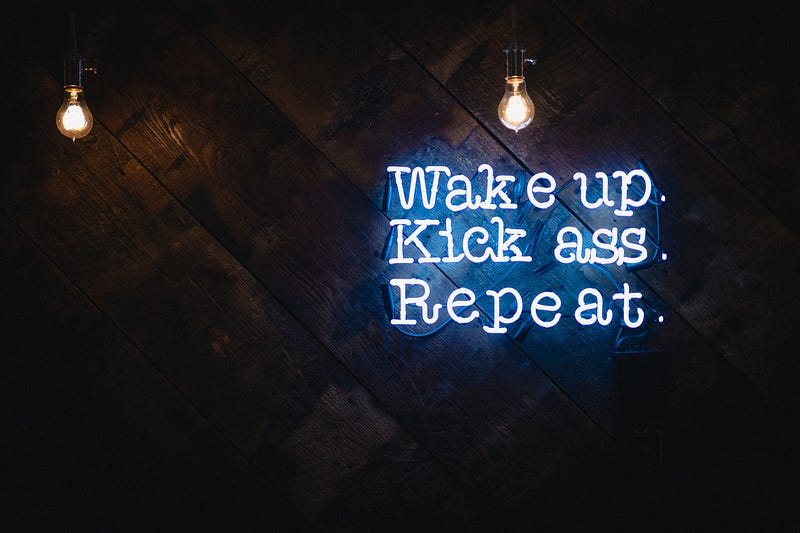I originally published this post on Medium. I copied it here in May 2024 to keep it alongside my other content.
You’ve no doubt seen this on LinkedIn or Twitter or Facebook, usually shared with intense earnesty:

What if we took this to its logical conclusion?
This piece has created a lot of reaction, as you might imagine. Some positive, but mostly negative from what I’ve seen. And I’ve got thoughts, too. I get the point being made in the piece, but I reject the list, because it’s reductive and patronizing and it denies English it’s rightful place as the world’s melting pot for language absorption and innovation.
But mostly, I’m fearful of this notion, in the wrong hands, being taken too far. For example, even the de-escalated language examples above are problematic when viewed through the same lens with sharper, and sharper focus:
- “We’re going to launch”
…OMG, you’re launching missiles at me? - “I’ll take the first pass”
…Pass? Are you hitting on me, you pig? - “…too soon”
Yikes! Did you just make a tasteless joke right after a tragedy? Monster. - “…avoid”
What a surprise — you’ve failed to live up to your social responsibility again! - “…feed”
Do I detect a hint of fat shaming? - “…due date”
How dare you! My pregnancy is none of your business. - “…opportunities”
Sure, but only for you rich, educated people!
…and I could go on. Yeah, I know my examples are ridiculous. But so are the original suggestions.
If you want to find fault in a word—any word—you can find it. It’s definitely there, especially in English where words can carry so many meanings and contexts simultaneously, not to mention history.

Words matter. Even more than we think.
Look, I get words carry meaning. I have an English degree and I studied literature and composition under deconstructionist professors for years. Indeed, plenty of academics think language and language processing is the thing that gives shape to complex ideas and has allowed our species to (clutch your pearls in 3, 2, 1…) conquer the physical world and bring structured order to natural “chaos.” Civilization itself springs from language. It’s everything.
But I also know words only carry the power we give to them, and each individual’s experiences tints their reality processing, their perceptions. For example, if you or your immediate family survived the Holocaust, hearing the English phrase “final solution” can be a reminder of Hitler’s atrocities (though obviously “final solution” is English for other words in the original German). It’s not something you want to think about! So you avoid the phrase and you might object when hearing it from others, despite the fact there are plenty of people unaware of the connection between those two innocuous words and literal genocide.
So the idea of banning violent phrases from our cliches and idioms — our culturally-bound language shortcuts (ouch! cuts!) — may have a well-intentioned source. Indeed, the proposed ban may be coming from someone that suffered unjust violence in their lives, so softening language is deeply meaningful to them. But it’s not to me. Yet we need to find a way to share this language and our experiences, without extinguishing one another in the process.
With 8 billion people out there (1.5 billion speaking English), we cannot take all perspectives, experiences, and sensitivities into account in every sentence and in every word choice. We’d end up saying nothing.
You can pry violent language from my cold, dead hands.
It is simply not possible to communicate with verve and color and joy and irony and humor and outrage without using words that carry multiple — sometimes personally and syntactically conflicting — meanings. We need a vast variety of words to capture the vast variety of our experiences.
Or does your local food truck festival only sport one truck, selling certified Level 5 Vegan options?

There must be room for language to innovate, and even to violate. There must also be room for language to listen, explore, and apologize. Because not every “violent” usage is meant to harm. A knife can kill, but it can also perform life-saving surgery. And yeah, it can even be used accidentally.
(BTW, I’m not talking about First Amendment rights here. I’m speaking up for language itself.)
Prof G on language
In a recent edition of “The Prof G Pod” show with NYU professor and investor Scott Galloway, he opined on his frequent use of vulgar language and off-color jokes in his media appearances, which some find shocking. He’s got thoughts on that. You can hear the relevant commentary starting around 42:00 into the recording, with a key quote below.
https://megaphone.link/VMP4108631167
…we have become so sensitive, we have become so easily offended, we have become so focused on how we divide each other by making a cartoon of each other’s comments and then making assertions and getting into this game of ‘Guardians of Gotcha’ and trying to get virtue points… To be offended in our nation is to be right, and it’s total bullshit. Being offended is your emotion, [but] productive conversations are, “this is why I think you’re wrong,” or “this is my view and how it contrasts with yours”… And the Left is spending so much time trying to find virtue points by calling out each other that it makes a cartoon of the important work we need to get done around systemic racism, around income inequality, around women’s rights… and it ends up hurting us because we’re seen as these people who are—worse than anything—that we’re just fucking humorless.
So let’s blow up this notion that “violent language” does violence to people by default. Some people? Sure. All people? Not a chance. Being aware of the power of words is vitally important, and I wish people spent more time accumulating the power of written and spoken words in school and in life, to appreciate this power and wield it more expertly.
To steal from the NRA: “Language doesn’t hurt people. People hurt people.”
Thanks. And sorry if I was too much of a straight shooter.
Discover more from digitalpolity.com
Subscribe to get the latest posts sent to your email.